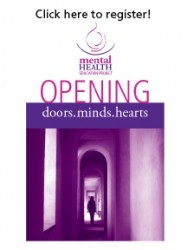 This is a guest post by Sarah Slavick at Jewish Family and Children’s Service of Minneapolis.
This is a guest post by Sarah Slavick at Jewish Family and Children’s Service of Minneapolis.
On June 12, 2000, the Twin Cities had a wake-up call about the need for education and understanding of mental health. Barbara Schneider, a Jewish woman living with mental illness in Uptown Minneapolis, was shot and killed by police.
Laurie Kramer, along with many other community members, took notice of the incident.
“My synagogue, Shir Tikvah, publicized (Schneider’s) memorial service at Temple Israel. Though I’d never met Barbara, I went to pay my respects,” Kramer says. “Listening to the service, I sensed a window of opportunity to open a conversation in the Jewish community on this very tough subject.”
Kramer had both professional and personal interest in bringing issues of mental health to the community: At the time, she was studying the use of mental health education as a way of reducing stigma, and her mother had suffered from bipolar disorder for much of her life.
“I knew first-hand the impact that mental illness has on a family,” Kramer says. “I thought I could help reduce stigma and, in that way, help families living with isolation and shame.”
So Kramer helped begin the Mental Health Education Project (MHEP) with the help of Jewish Family and Children’s Service of Minneapolis (JFCS) and, later, Jewish Family Service of St. Paul (JFS).
This year MHEP is having its 10th annual conference on mental health. Opening Doors, Minds, Hearts will be Sunday, Nov. 7, from 12:30-6 p.m. at Temple Israel (2324 Emerson Ave. S. Minneapolis), and is free and open to everyone.
“The annual conference makes a public statement that the Jewish community cares about individuals and families struggling with mental illness,” Kramer says. “We publicize resources available through Jewish Family and Children’s Service of Minneapolis and Jewish Family Service of St. Paul, as well as in the general community. We invite people who may feel alienated from the community to become part of it.”
Thanks to the sponsorship of JFCS and JFS, and the additional support of many community members and organizations, the conference continues to be free and open to everyone. To register, please call 651-698-0767 or go to http://www.jfcsmpls.org/mhepclasses.htm.
Judy Halper, JFCS CEO, says that JFCS has been involved with MHEP from the start because of the need for inclusion of all people.
“JFCS has the resources, programs and staff to help people reach their full potential,” Halper says. “We are a caring community and we need to dissolve the stigmas that keep individuals and families isolated and unserved.”
Author Michael Greenberg will bring a parental perspective to the conference’s keynote session. His memoir, Hurry Down Sunshine: A Father’s Story of Love and Madness, describes the experience of having a teenage daughter suddenly gripped by mental illness.
Two sessions of workshops will follow the keynote, with about 20 topics appealing to all ages. Presenters include psychiatrists and other mental health professionals, rabbis, and individuals with experiences to share. A resource fair, refreshments and closing ceremony are also part of the day.
Rena Waxman, JFS Executive Director, says MHEP helps bring attention to crucial issues. “The simple fact of the matter is we want people to be able to live the healthiest and most satisfying lives they are able to. One of the things that can be an issue is an individual’s mental health, and we really want to be sure that people understand that,” Waxman says.
MHEP’s conference coordinator, Kramer, hopes the conference educates the community this year, as it has in its previous nine years.
“I hope people come away from the conference with the understanding that mental health problems come in all shapes and sizes,” Kramer says. “They can be mild or serious. They can affect children, teens, adults and the elderly. They are common in all communities — including the Jewish community — and there are resources available to help. If people are struggling themselves, they can come to understand that they are not alone.”
MHEP is part of J-CHAI, the Jewish Community Health Awareness Initiative. The J-CHAI vision is that the Twin Cities Jewish community becomes welcoming to all members and visitors, offering a nurturing, safe place to find support and assistance with issues of health and well-being. Other programs of J-CHAI include the Jewish Domestic Abuse Collaborative and Health Youth-Health Communities. For more information about J-CHAI, contact Betsy Sitkoff at 952-542-4833 or [email protected].
October 27, 2010
Opening Doors, Minds, Hearts: A Mental Health Wake Up Call

1 comment



Sarah: Thanks for sharing this information with the TCJF community! This is a great event. I’ll be participating in a panel discussion, “Ask a Psychotherapist,” on Sunday afternoon.
Chris